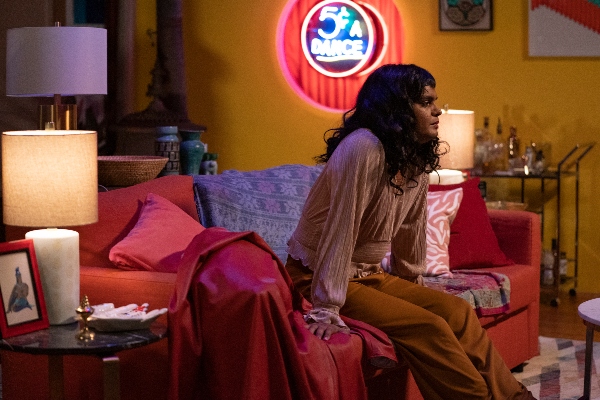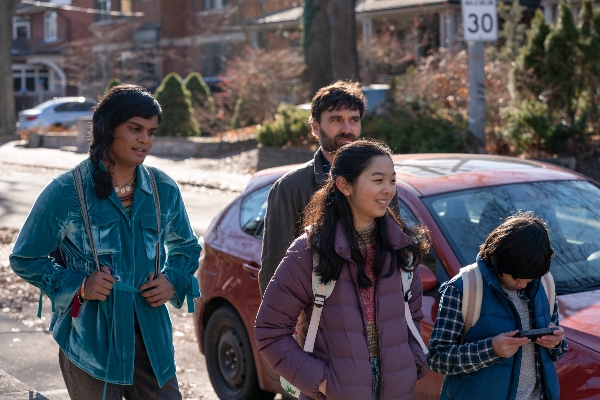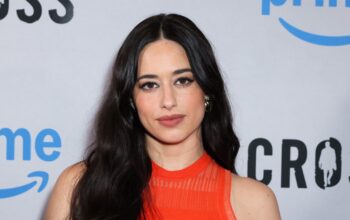Tonight marks the series premiere of Sort Of, a groundbreaking dramatic comedy, unlike any story we’ve seen on TV before. It’s about a gender-fluid millennial, Sabi (Bilal Baig), who is trying to balance being the child of Pakistani immigrants, a bartender at an LGBTQ bookstore/café, and caregiver to the children of a professional couple … all while trying to figure out who they are and their place in the world.
It’s a beautifully told story that captures the essence of a generation where the path forward isn’t as clear as it was for their parents and grandparents. I immediately related to that sense of being constantly in a state of transition, whether it’s about career, relationships, or self-identity. We no longer have to shape ourselves to fit into these narrowly defined little boxes that keep us from becoming our true selves.
In a conversation with Bilal Baig (co-creator, co-showrunner and star) and Fab Filippo (co-creator, co-showrunner and director) ahead of the CBC Gem premiere in Canada, we discussed how the series came to be, the universality of Sabi’s story, and why now is the perfect time for a show like Sort Of.
Fab, what was it about this project that made you want to be a part of bringing it to life?
Fab: It wasn’t even the story. It was meeting Bilal for the first time. We were both acting in a [stage] show, and I was struck by them as a performer, but as a person as well. It wasn’t even like, “Oh, we should make a show together.” It was more that I was the elder of the cast and asked, “What are you doing right now? What are you writing?” Eventually, it was like, “Let’s pitch some ideas around and see how that feels.” We recognized that we have similar senses of humour. We both like that achy part of storytelling and mixing it with comedy, and then Sort Of was born. It never felt like I was going to tell this story and Bilal was going to be a part of it. It felt very much like we had to share this story with the world together.
Bilal, this is your first foray into television. I’m guessing there was a bit of a learning curve. How did collaborating with Fab help with exploring this new medium?
Bilal: There was a very steep learning curve that I feel like I’m still on, but it’s amazing and rewarding. For me, I was curious about collaboration, like what it means for two people to work on something together, and all the things that Fab mentioned around having a similar sense of humour. Things that resonate with me are key, but I also love the way Fab and I made space for each other. Fab’s heart is in this as much as mine is, especially when we look at the character of Paul (played by Gray Powell) and that arc in particular. I don’t know what it means to have kids, and having those kids transforming in front of you. We were both able to bring our hearts into it, and this series is the result of that.
Based on the first two episodes, I was so impressed by how accurately you portrayed being at a crossroads in life, not having a clear path forward, and dealing with uncertainty. How were you able to capture that so perfectly?
Fab: From my point of view, it’s a combination of what we were trying to achieve and then, in the making of it, how you make something is as important as what you make. Bilal and I were very clear that neither of us was going to feel that one of us was stepping on the other’s vision. We would find a way to merge what we saw for the show. We trusted each other in the realms that we weren’t as comfortable in. Bilal put a lot of trust in me as a director. The other part is shooting in a pandemic added this topsy-turviness to everything, and so the way we had to shoot was very different from what it is usually.
A large part of Sabi’s arc is working as a caregiver to Violet and Henry. At first, it appears to be more of a job and a way to make money. Viewers quickly realize that Sabi understands these children more than anyone else. Does that relationship with the kids continue to play into Sabi’s journey of discovering who they are?
Bilal: It speaks to this complicated idea of what it actually means to have arrived, or to be living your best life, things that we toss around when we’re talking to our friends. I can say it’s all a part of Sabi stepping into their skin a little more. To feel like you need to be somewhere else — but at the same time not resisting exactly where you are — suggests there’s a disconnect or imbalance in how you’re seeing yourself and how you might think the world is seeing you. Our first season, and hopefully beyond, continues to look at what it means to feel settled in yourself, and for it to be okay if it’s not exactly the thing you want to be doing. We explore that through Sabi’s relationship to their biological family as well with 7ven (Amanda Cordner), their friend, and with the queer and trans world.
Why do you think that now is the perfect time for a series like Sort Of?
Bilal: We’re building on a bit of a history of the inclusion of trans and non-binary people as characters, and not just as props or vehicles where bad things happen to them, as well as for BIPOC folks at that intersection. We do exist, we aren’t a myth, we are here and a part of the world as much as everybody else. So I see that movement. I also wonder how the pandemic plays into it. Talk about an epic transition that our world is going through, and maybe that has something to do with it. The timing of it feels right. Part of it is people having a lot of time to reflect, look inwards, and wonder about themselves and their journeys.
Fab: It’s going to be interesting to see the reception and who the audience is. The show has an intersectionality to it that not a lot of shows have. It’s not forced.
Watch Sort of on CBC Gem beginning Tuesday, October 5. A premiere date on HBO Max will be announced at a later date.
Images Courtesy of CBC





Just finished what’s currently available. LOVED it. Entertained and more! Thank you.